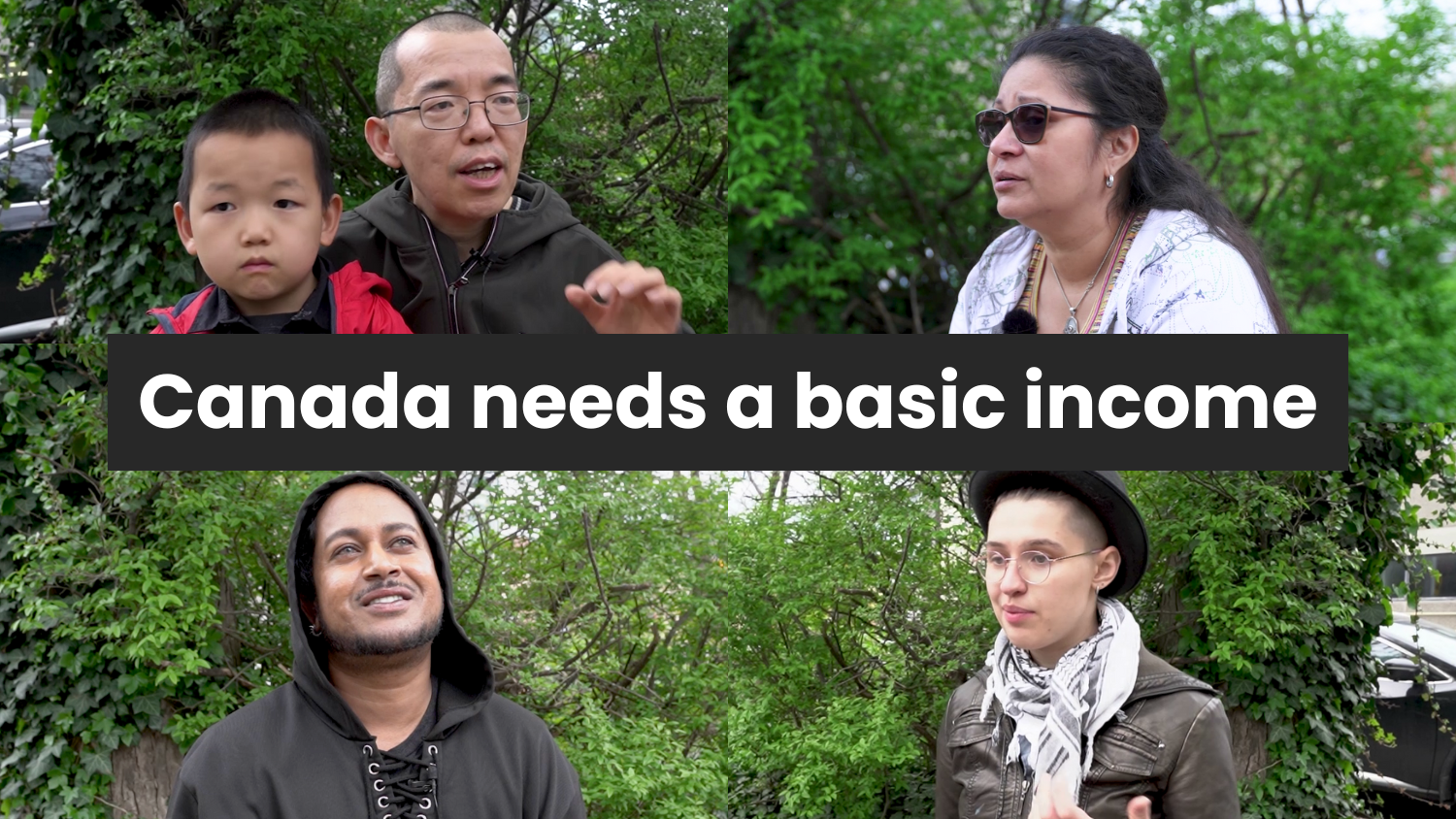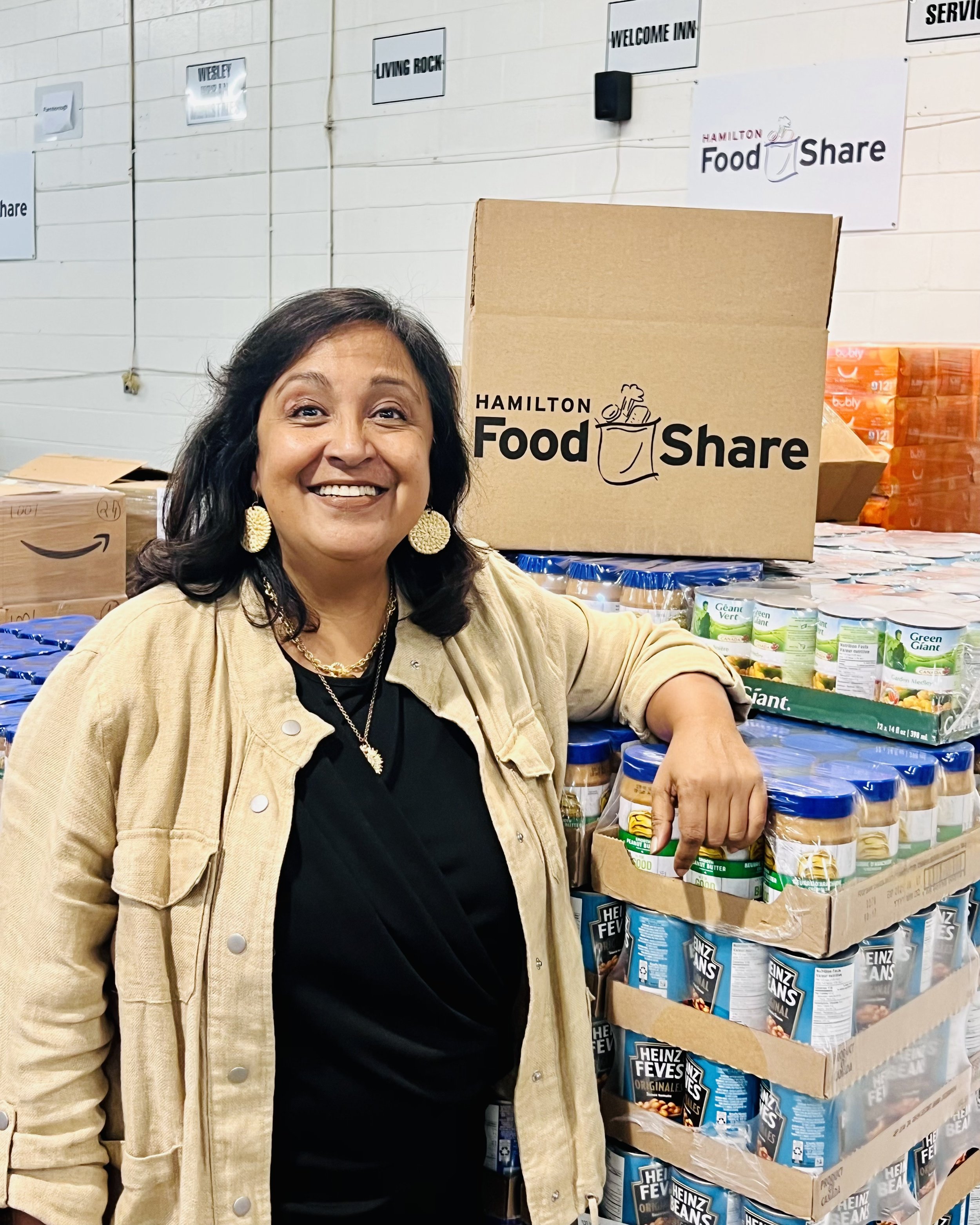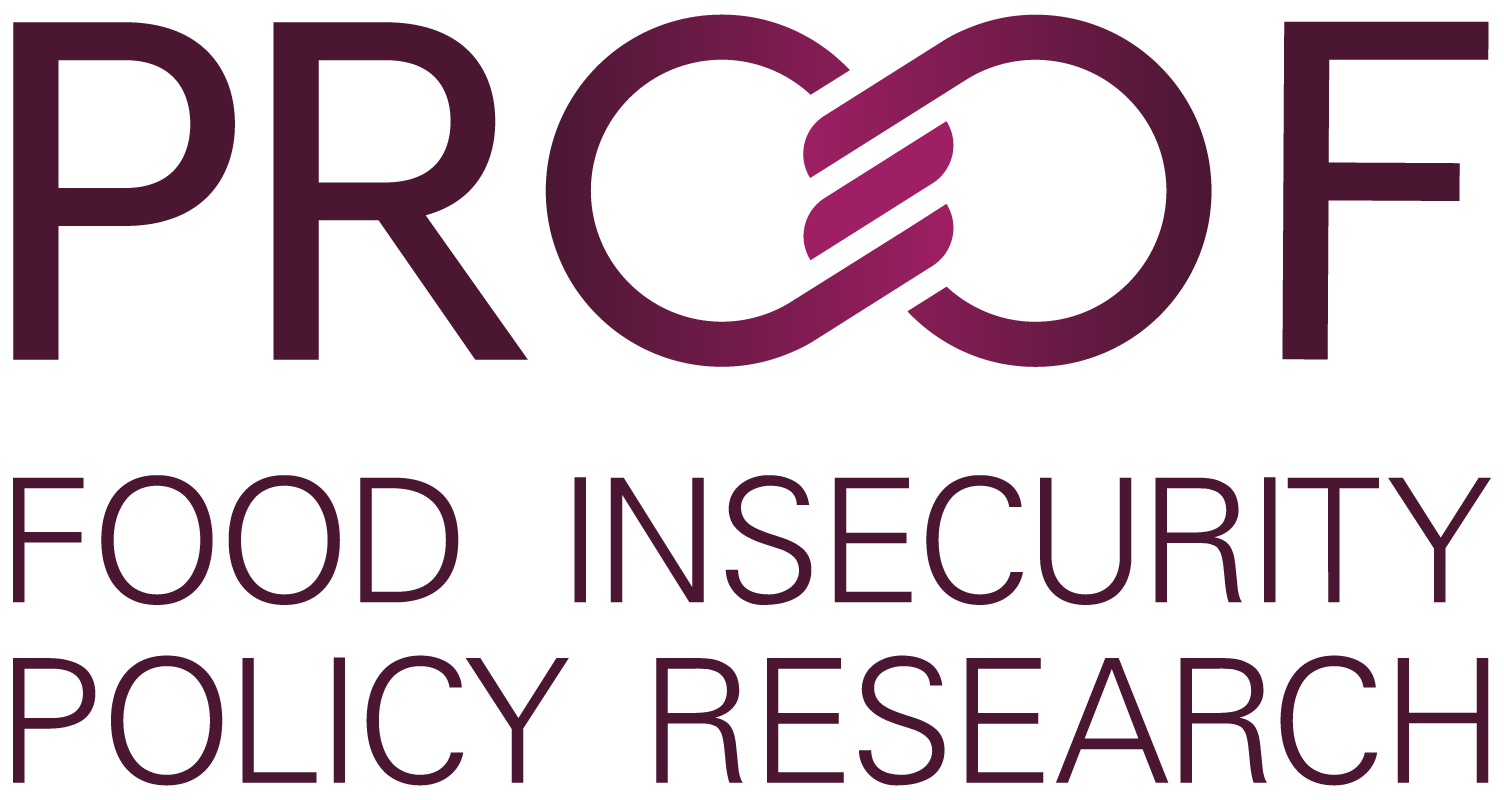We’re advocating for all levels of government to work together to implement a guaranteed liveable basic income, so that nobody in Canada can fall below the poverty line.
Leaders from across the food bank and food security sector are calling on federal and provincial politicians to support a basic income in Canada to give people a fighting chance of escaping poverty and living with dignity.
Who's Affected:
10 million Canadians are food insecure.
Black and Indigenous people are twice as likely to be food insecure in Canada!
Almost 1 in 2 single mothers (and their children) are food insecure.
Unattached singles on welfare in Canada live in deep poverty on incomes that are 63 per cent below the poverty line.
People with disabilities are twice as likely to live below the poverty line.
The Cost Of Poverty:
Poverty costs Canadians $84 billion per year!
People who are severely food insecure cost taxpayers more than double in healthcare spending.
Homelessness costs $10 billion per year.
It can cost up to $90,000 per year to house just one person in a shelter.
It costs $200,000 per year to keep one woman in prison - most of whom are there because of poverty-related crimes.
Food insecurity is worse than it’s ever been. For too long the federal and provincial governments have been failing people in Canada, and food banks have been picking up the slack.
Why Canada Needs A Basic Income: A Conversation With Senator Kim Pate.
Senator Pate wants to see a guaranteed liveable basic income to help address systemic racism and sexism, weflare system failure, inadequate wages, wealth inequality, and to give people struggling with the cycle of poverty a fighting chance.
“What’s the point of having a poverty line if it doesn’t help us keep people out of poverty!?”
– Matt Noble, Executive Director,
Toronto Vegetarian Food Bank / Put Food Banks Out Of Business
“Legislated Poverty”
People in Canada who are severely food insecure are often those dependent on social assistance - the same people who depend on food banks. Across Canada the problem is the same - social assistance payments are so low that they trap people in a cycle of poverty that’s almost impossible to escape. Legislated poverty.
Zakiya Tafari, Executive Director
Afri-Can FoodBasket
“It’s unacceptable that 2 in 5 Black Canadians are facing food insecurity. Racial income inequality, rising living costs, and structural barriers are holding hardworking Black families back from thriving. We need real change now. A basic income would ensure that Black families no longer have to choose between paying bills and having healthy meals—especially the cultural meals that connect them to their roots. This isn’t just about food—it’s about addressing the systemic challenges that continue to prevent access to basic necessities.”
What is food insecurity?
And who are the 10 million people in Canada who are affected by it..?
Valerie Tarasuk runs PROOF, a research project that looks at how, in Canada, we can use policy to eliminate food insecurity.
Rachael Wilson
former CEO, Ottawa Food Bank
"Food banks have been filling the gaps left by the lack of government policy for over 40 years. While food banks can be a part of the solution, we need the government at all levels to address the issues at the root of poverty and food insecurity. We are seeing a food insecurity crisis across the country. What more needs to happen before we decide to take the necessary steps to ensure that every Canadian has food on the table and a roof over their head? We need a Guaranteed Basic Income now."
*
Radhika Subramanyan
CEO, Hamilton Food Share:
“With skyrocketing rental rates, the instability of gig work, and social assistance falling far below what’s needed, too many are struggling just to survive. A basic income could transform lives, offering the stability and hope that people deserve. Together, we can address the root cause of poverty and food insecurity and build a future where food banks are no longer necessary.”
PROOF is an interdisciplinary research program examining effective policy interventions to reduce household food insecurity in Canada.
Their work shines a spotlight on the size and seriousness of food insecurity in Canada, the inability for charitable assistance to resolve it, and how it can be remedied through public policies supporting adequate incomes.
Dan Huang-Taylor
Executive Director, Food Banks BC
“In BC, a full-time minimum wage job only covers two-thirds of a person's essential living expenses. The 'working poor' are one of the fastest-growing groups turning to food banks. Social assistance, disability supports, and other government benefits are not keeping pace with the cost of living, leaving many people on fixed incomes entrenched in poverty with no option other than accessing their local food bank. Urgent action to address this crisis is needed now. Introducing a guaranteed liveable basic income would represent a massive step towards a future where food banks are a thing of the past.”
“Basic income… would allow all Canadians to decide for themselves how to live their lives without the coercion of grinding poverty, the stress of income insecurity or the humiliation associated with income assistance.”
– Evelyn L. Forget
Meghan Nicholls
CEO, Mississauga Food Bank
“There is a food insecurity emergency in our country - Mississauga even formally declared it an emergency in November! More people are relying on food banks than ever before because social assistance programs and wages haven’t kept up with the cost of living and folks get stuck in a cycle that prevents them from moving ahead. Food banks are desperately trying to keep up with the ever-growing demand. Guaranteed Basic Income would be a starting point for our government to take action NOW to support those who are most vulnerable in our communities.”
“We call upon all governments to establish a guaranteed annual livable income for all Canadians, including Indigenous Peoples, to meet all their social and economic needs. This income must take into account diverse needs, realities, and geographic locations.”
— Missing and Murdered Indigenous Women and Girls - Call for Justice 4.5
Ben Earle
CEO, Feed The Need in Durham:
“A basic income would reduce the deep poverty faced by millions of Canadians and is necessary for addressing the alarming crisis of food insecurity that's sweeping the country.”
Join us in demanding a basic income
FAQs
-
“Today it is working-age unattached singles who have the highest rates of poverty at 31 per cent in 2022, up nearly five percentage points from 26.2 per cent in 2021. All levels of government provide very little income support for working-age unattached singles living in deep poverty.” - Warning Signs: Poverty in 2022 (Maytree)
“In 2023, 22.9% of people in the ten provinces lived in a food-insecure household. That amounts to 8.7 million people, including 2.1 million children, living in households that struggled to afford the food they need. With another year of rising food insecurity, the percentage of people affected is at a new record high.” - PROOF, New data on households food insecurity in 2023
-
Welfare programs in Canada have not kept up with inflation, so the poorest Canadians have been struggling with deeper and deeper poverty every year!
In Ontario, the poverty line is $27,631 per year, whereas someone receiving Ontario Works (welfare) gets an average of only $10,253 per year.
Poverty has deepened for unattached singles on welfare (in Ontario) over the past twenty years. Their poverty rates have increased from incomes being 55 percent below the poverty line in 2002, to 63 per cent below the poverty line in 2022 - an eight percentage point reduction in income. Ontario welfare recipients have consistently lived in deep poverty for the last 20 years. (Source: Welfare in Canada, 2022)
Canadian welfare programs trap people in a cycle of poverty that’s difficult to escape.
The depth of poverty and food insecurity faced by people who end up dependent on welfare is not only unnecessarily cruel, but it’s expensive!
-
Basic income is not a silver bullet for structural racism, however it is an important policy for addressing the poverty, food insecurity and income inequality faced by racialized communities.
In Canada, 2 in 5 Black and Indigenous people live in households experiencing food insecurity.
“We call upon all governments to establish a guaranteed annual livable income for all Canadians, including Indigenous Peoples, to meet all their social and economic needs. This income must take into account diverse needs, realities, and geographic locations.” - Recommendation 4.5 from the Missing and Murdered Indigenous Women and Girls, Calls for Justice
-
Poverty is expensive.
“Poverty costs Canada as a whole between $72 billion and $84 billion annually.”
”Homelessness alone costs the Canadian economy around $10 billion per year.”
There are many different models and designs for a basic income.
A guaranteed liveable basic income that’s targeted at eliminating poverty is the cheapest model, which also provides the greatest return on investment to tax-payers.
“‘Most recently, [the Parliamentary Budget Officer] provided an example of a program that could deliver $80 billion in supports for a net cost of only $3 billion by replacing tax measures like the GST credit and basic personal amount, as well as provincial and territorial social assistance,’ [Senator Kim Pate] said.
Pate noted that estimate doesn’t include future cost savings associated with downstream social and economic benefits, such as reductions in health care, the criminal legal system and emergency shelter spending.”
-
There’s no evidence to suggest that people will stop working if we have a social safety net that keeps people from falling into deep poverty.
A basic income design that lets people keep $0.50 of the basic income for every dollar they earn from working will incentivize people to work, while reducing the cost of the basic income program.
The lowest unemployment rate in Canadian history was 4.8 per cent, but it tends to hover around 8.2 per cent (so, at all times, at least 1 on 20 people in Canada can’t find a job).
There has never been full-employment - this is just how our current economy works.
That said, most basic income studies show no drop in labour force participation - probably because more money is circulating in the economy - but they do show…
"We know that the best empirical evidence out there suggests that a well-designed basic income will not substantially reduce the number of hours worked. Some people have argued that it will increase the hours worked, or move people into better jobs.” - Evelyn Forget, S-233 - Standing Senate Committee on National Finance, Tuesday, October 17, 2023 (meeting no. 73)
-
“We also found that the cash transfer did not lead to increased spending on alcohol, drugs, and cigarettes; instead the cash transfer reduced substance use severity by 90% in our recipients. The cash was primarily spent on food, rent, transit and durable goods.
In fact, hundreds of cash transfers around the world have demonstrated the same pattern of results: Improved wellbeing, improved health conditions, cognitive function, and food security.” - Jiaying Zhao, Associate Professor, Department of Psychology, University of British Columbia, S-233 - Standing Senate Committee on National Finance, Tuesday, October 17, 2023 (meeting no. 73)
-
There has never been full employment in Canada. At any point in time 1+ in 20 people can’t find a job.
A basic income gives workers more power to say ‘No’ to low wages and exploitative or dangerous jobs, and studies of wages where basic income has been tested show an increase in hourly wages.
-
Indigenous communities are nations. The government of Canada should not be the one to design a basic income for indigenous communities.
A total payment, based on a per capita amount (and an administrative payment), can be given to communities, on a predictable basis, which they can use in whatever way they deem best for the members of their communities.
A basic income is by no means full or adequate compensation from Canada for everything that has been taken from indigenous communities, but it’s a predictable amount that would help to address poverty and food insecurity. It’s the least Canada can do.
* Communities should be able to choose to use the current tax system, or welfare system, to target individuals who are most in need, if they want to do it in that way.
-
A basic income should be paired with other policies - like rent control - that make housing and land more affordable for everyone.
Rent control keeps rents tied to inflation, so that landlords can’t raise rents and extract money from people receiving a basic income.
-
Yes, the government would still need to invest in building non-market housing. There isn’t currently enough housing supply to meet demand.
Investing in non-market housing helps to de-financialize the housing market.
Building more non-market housing helps keep land and housing prices in check, so that the government and not-for-profits can purchase land to build housing at lower-cost.
-
Non-market housing can complement a basic income very nicely.
If people receiving a basic income were to live in non-market government or not-for-profit housing, those homes could be Rent Geared to Income (RGI), so that they don’t cost more than one third of a person’s total income.




















